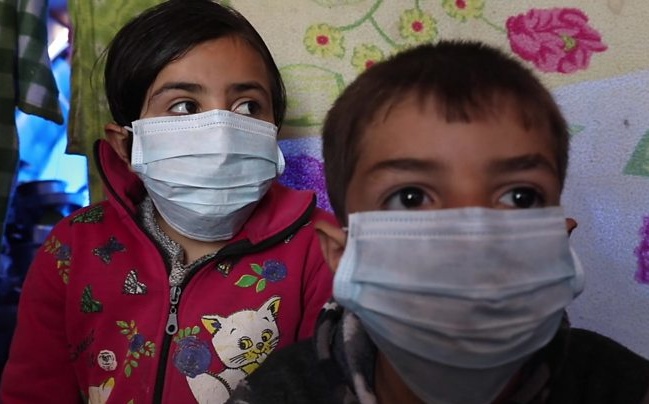Children in a camp for displaced persons in Idlib Province, northwest Syria
UN aid head Mark Lowcock has warned that the Assad regime’s official count of 10 Coronavirus cases is the “tip of the iceberg”.
In a presentation to a virtual Security Council meeting, Lowcock echoed local medics, activists, and residents in questioning the regime’s limited number. Damascus only acknowledged the first case last week and the first death on Sunday.
“Judging from other places, that is the tip of the iceberg. The virus has the potential to have a devastating impact on vulnerable communities across the country,” Lowcock said.
Referring implicitly to the devastation of medical facilities in the opposition-held northwest by Russian-regime bombing, Lowcock explained, “Syria’s health services are extremely fragile. Only around half of its hospitals and primary healthcare centers were fully functional at the end of last year.”
He said fear of the virus has further restricting aid operations and access to communities that might be affected: “It is important that there is appropriate facilitation for movements of humanitarian workers and supplies and for medical evacuations so that local health and broader humanitarian responses can be supported.”
The head of the Office for Coordination of Humanitarian Affairs called for the waiving of sanctions on the Assad regime, imposed because of its crushing of the Syrian uprising from 2011,
Call for Ceasefire
UN envoy Geir Pedersen complemented Lowcock’s assessment:
Governance is weak or even absent in some areas. Years of conflict have left the healthcare system degraded or destroyed. Health professionals, medical equipment and supplies are desperately lacking.
This virus does not care if you live in government-controlled areas or outside. It does not discriminate. It endangers all Syrians.
While only acknowledging the 10 cases, the regime has imposed a 6 pm-6am curfew across all its territory and banned movement between provinces. Schools, universities, and institutes are closed; bakeries are shut; and public transport banned. On Sunday, the military suspended the call-up of army reserves.
Damascus airport has halted commercial flights, although movement of Iranian personnel and equipment — essential to propping up the regime military — may be continuing.
No cases have been confirmed yet in opposition-held northwest Syria, but medics and aid agencies are warning of decimation from an outbreak. The Russian-regime attacks, in an offensive since last April, have displaced more than 1 million people into overcrowded camps with poor sanitation and little or no water.
See also Syria Daily, March 21: Coronavirus — “Wash Our Hands? We Can’t Wash Our Kids For A Week”
Lowcock amplified Pedersen’s call, made last week, for a complete and immediate ceasefire. He spoke of the critical medical situation:
People are afraid; needs are vast and complex; local aid workers are delivering tirelessly under near-impossible conditions; but the response is overwhelmed.

